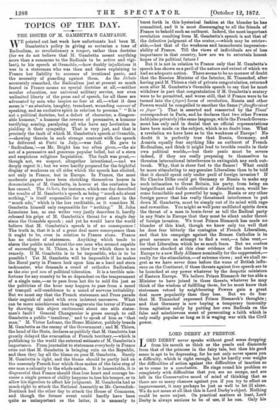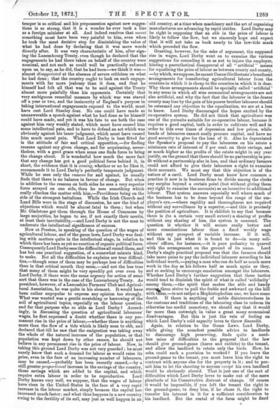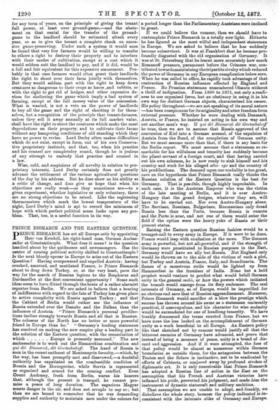LORD DERBY AT PRESTON.
LORD DERBY never speaks without good sense dropping from his mouth as thick as the pearls and diamond% from that of the princess in the fairy tale, but then his good sense is apt to be depressing, for he not only never spares you a difficulty, which is right enough, but he hardly ever weighs the difficulties of action against the difficulties of inaction so as to come to a conclusion. He rings round his problem so. completely with difficulties that you see no escape, and are left in the Conservative mood of mind of thinking that as there are so many chances against you if you try to effect an improvement, it may perhaps be just as well to let ill alone.. We do not mean at all that this is Lord Derby's object. Nothing could be more unjust. On practical matters at least, Lord- Derby is always anxious to be of use, if he can. Only his temper is so critical and his prepossession against new sugges- tions is so strong, that it is a wonder he ever took a line as a foreign minister at all. And indeed resolves that meant something must have been very painful to him, even when he took the most decisive step for diminishing the value of what he had done by declaring that it was mere words directly after. It was very characteristic of him, after sign- ing the Luxembourg Treaty, even though he declared that the engagements he had there taken on behalf of the country were nominal, and not such as could well be practically enforced upon us, to say, as he did, that he had been—we think it was— almost disappointed at the absence of severe criticism on what he had done • that the country ought to look on such engage- ments with far more jealousy than it does, and that he himself had felt all that was to be said against the Treaty almost more painfully than his opponents. Certainly that very ambiguous remedial measure by which- war was staved off a year or two, and the insincerity of England's purpose in taking international engagements exposed to the world, must have cost Lord Stanley dear. No one could have made so unanswerable a speech against what he had done as he himself could have made, and yet it was his fate to see both the case against him very weakly stated, which must have caused him some intellectual pain, and to have to defend an act which was obviously against his inner judgment, which must have caused him much moral pain. What Lord Derby is best fitted for is the attitude of fair and critical opposition,—for finding reasons against any given change, and for acquiescing, never- theless, with a good grace when some one finds force to bring the change about. It is wonderful how much the mere fact that any change has got a good political force behind it, in short, the evidence that it is coming, whether or no he likes it, recommends it to Lord Derby's perfectly temperate judgment. While he sees only the reasons for and against, he usually finds that there is no balance in favour of change. But when in addition to the reasons on both sides he sees a very superior force arrayed on one side, then he sees something which really clinches the matter with him,—Providence being on the side of the strongest battalions. While the Irish Church and Land Bills were in the stage of discussion, he saw the kind of objections which would be almost fatal to them ; but when Mr. Gladstone got them through the House of Commons by large majorities, he began to see, if not exactly their merits, at least their inevitability,—and Lord Derby is not the man to underrate the intellectual significance of success.
Now at Preston, in speaking of the question of the wages of agricultural labour, and of the game laws, Lord Derby was deal- ing with matters quite in the intellectual stage, in relation to which there has been as yet no exertion of organic political force. Consequently Lord Derby sees the difficulties all round them, and has but one practical suggestion, of a somewhat minute kind, to make. But all the difficulties he explains are tree difficul- ties,—though some of them may be perhaps less of difficulties than in that critical mouth they seem,—and not the less true that many of them might be very speedily got over even by Lord Derby, if there were the same urgency for action of some sort that there was in the case of the Luxembourg Treaty. As president, however, of a Lancashire Farmers' Club and Agricul- tural Association, he was quite in his element. It would have been rather unpopular to express any opinion too strongly. What was wanted was a gentle scratching or harrowing of the soil of agricultural topics, especially on the labour question. and for that purpose who so able as Lord Derby Accord- ingly, in discussing the question of agricultural labourers' wages, he first expressed a doubt whether there is any per- manent rise in the price of labour,—whether there is anything more than the flow of a tide which is likely soon to ebb, and declared that till he saw that the emigration was taking away the whole of the natural increase of the population, or that population was kept down by other causes, he should not believe in any permanent rise in the price of labour. Now, in taking this ground Lord Derby was not very guarded ; he must surely know that such a demand for labour as would raise its price, even in the face of an increasing number of labourers, may be caused,—probably has been recently caused,—by a still greater proportional increase in the savings of the country, those savings which are added to the capital, and which require extra labour in order to be reproductive. Lord Derby knows very well, we suppose, that the wages of labour have risen in the United States in the face of a very rapid increase in the labour market, simply because the capital has Increased much faster; and what thus happens in a new country owing to the fertility of its soil, may just as well happen in an old country, at a time when machinery and the art of organising manufactures are advancing by rapid strides. Lord Derby may be right in supposing that an ebb in the price of labour is likely to follow the flow, but we sincerely hope and expect that it will not take us back nearly to the low-tide mark which preceded the flow.
Granting, however, for the sake of argument, the supposed rise in wages, Lord Derby went on to examine the various
suggestions for conceding it so as not to injure the employer, hinting a parenthetical disapproval of all " artificial " means for equalising the price of labour as between county and county, —by which, we suppose, he meant Canon Girdlestone's beneficent arrangements for transferring agricultural labour from the counties in which it is cheap to the counties in which it is dear. Why those arrangements should be specially called 'artificial' in any sense in which all wise economical arrangements are not also artificial, and why the fact that the labourer in the dearer county may lose by the gain of his poorer brother labourer should be esteemed any objection to the equalisation, we are at a loss to know. Lord Derby discouraged the hopes excited by the co-operative system. He did not think that agriculture was one of the pursuits suitable for co-operative labour, because it requires a good capital, both in order to cultivate well and in order to tide over times of depression and low prices, while bands of labourers cannot easily procure capital, and have no good security to give for the loan of it. Also he depreciated the Speaker's proposal to pay the labourers on his estate a minimum rate of interest of 2 per cent. on their savings, and as much higher as the profits of the estate might in any year justify, on the ground that there should be no partnership in pro- fit without a partnership also in loss, and that ordinary farmers could not afford to give their labourers a right to examine their accounts. We must say that this objection is of the nature of a cavil. Lord Derby must know how common a practice it now is in business firms to divide among the clerks any surplus beyond a certain point (but without giving them any right to examine the accounts) as an incentive to additional labour. That system answers especially well where much of the business has to be done beyond the range of the em- ployer's eye,—where rapidity and thoroughness are required without any surveillance by a superior,—and this is precisely the position of agriculture. It is childish to Bay that because there is (to a certain very small extent) a sharing of profits without any sharing of loss, the system is unsound. The question is whether it will secure really better and more conscientious labour than a fixed weekly wage without any prospect of variable increase. If it will, and this is just what it is found to do—in many soli- citors' offices, for instance,—it is pure pedantry to quarrel with the arrangement on the ground of its name. Lord Derby's single practical proposal was that the farmers should take more pains to pay the individual labourer according to his individual worth,—paying a man who can do half as much more work in the day as his fellows half as much again as they, and so seeking to encourage, emulation amongst the labourers. Whether Lord Derby's further suggestion that these tactics would tend to diminish the spirit of what is called 'solidarity' among them,—the spirit that makes the able and handy amonskthem strive to pull the feeble and awkward up the hill with tfilim,—is not rather a Mephistophelian one, we have some doubt. If there is anything of noble disinterestedness in the customs and traditions of the labouring class to redeem its otherwise too sordid monotony, we should say that it would far more than outweigh in value a great many economical disadvantages. But this is just the vein of feeling on which Lord Derby's cold sagacity loves to throw discredit.
Again, in relation to the Game Laws, Lord Derby, while giving the soundest possible advice to landlords to discourage high preserving, finds quite a need-
less mine of difficulties to the proposal that the law should give ground-game (hares and rabbits) to the tenant,
and allow the landlord to retain only the birds. How, he asks, could such a provision be worked? If you leave the ground-game to the tenant, you must leave him the right to contract with anyone else for the property in it ; and to per- mit him to let the shooting to anyone except his own landlord would be obviously absurd. That is just one of the sort of difficulties which Lord Derby loves to make out of the mere plenitude of his Conservative distrust of change. Of course it would be impossible, if you left the tenant the right in
the ground-game, to deny him, if he chose it, the right to transfer his interest in it for a sufficient consideration to his landlord. But the rental of the farm might be fixed for any term of years, on the principle of giving the tenant full power, at least over ground-game,—and the abate- ment on that rental for the transfer of the ground- game to the landlord should be estimated afresh every year, so as to give the tenant a complete cheek on exces- sive game-preserving. Under such a system it would soon be found that very few farmers would be willing to transfer to others a right to destroy their property and to interfere with their modes of cultivation, except at a cost which it would seldom suit the landlord to pay, and if it did, would be a full and fair equivalent for this expensive amusement. Pro- bably in that case farmers would often grant their landlords the right to shoot over their farm jointly with themselves. But they would seldom part with the right to keep down creatures so dangerous to their crops as hares _And rabbits, or with the right to get rid of hedges, and other expensive de- vices for sheltering the game which imply a bad system of larming, except at the full _money value of the concession. What is wanted, is not a veto on the power of landlords to buy all the game and the -right of shooting it for them- selves, but a recognition of the principle that tenant-farmers, unless they sell it away annually at its full market value, shall have the right to shoot the creatures which make the most depredations on their property, and to cultivate their farms without any hampering conditions of old standing which they have no ,power to revise. :Lord Derby often makes difficulties which do not exist, except in form, out of his own Conserva- tive proprietary instincts, and that, too, when his practice and his counsel are completeley sound, though he is jealous of any attempt to embody that practice and -counsel in a law.
Wise, cold, and suspicious of all novelty in relation to pro- prietary interests, Lord Derby certainly does not greatly advance the settlement of the various agricultural questions of the day by his address. But he does allow us his ability as a critic of change, and does give us hope that when his objections are really weak—as they sometimes are—to a given experiment, whether legislative or only voluntary, there are no strong objections to be raised. Like the registering thermometers which mark the lowest temperature of the night, Lord Derby's mind is apt to record the minimum of hope with which perfect political sense looks upon any pro- blem. That, too, is a useful function in its way.




































 Previous page
Previous page